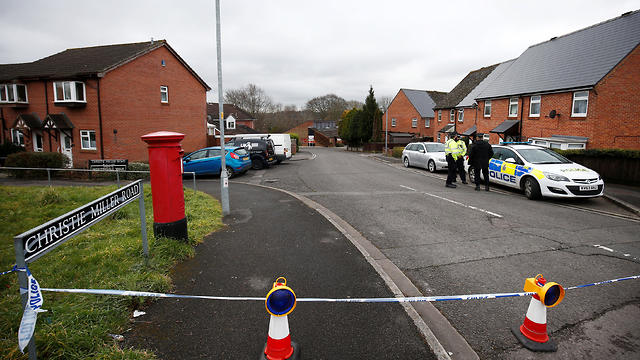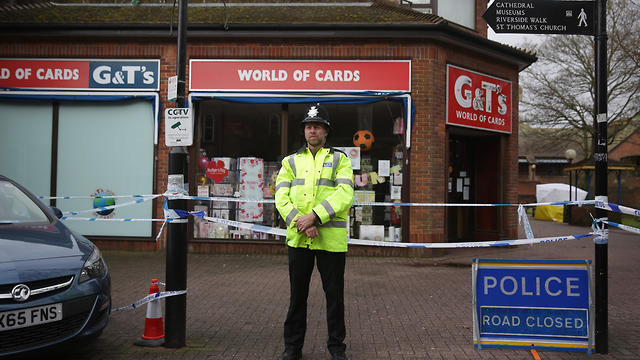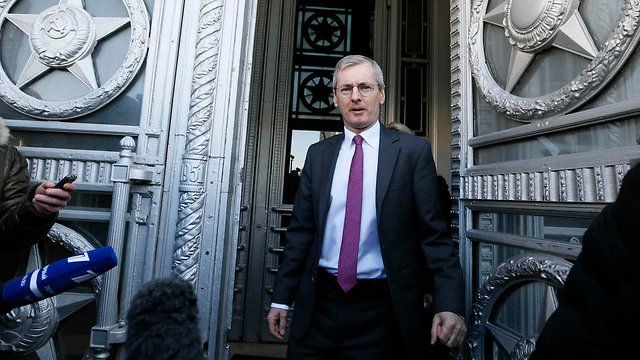

Russia lauds 'West Jerusalem' for 'wise position' on spy poisoning
Following Foreign Affairs Ministry statement sidestepping naming Russia as culprit in poisoning of Russian double agent and his daughter, Russian embassy in Israel praises 'wise position' by 'West Jerusalem; Russian embassy further notes concern at 'attempts undertaken by UK government to draw Israel into political and propagandistic campaign.'
The Russian Embassy in Israel published an irregular official statement over the weekend praising the Israeli government—which the statement referred to as "West Jerusalem"—over its "wise position" regarding the March poisoning of a Russian double agent and his daughter in southern England.
The Israeli statement, published Thursday by Foreign Affairs Ministry spokesman Emmanuel Nahshon, read, "Israel views with gravity the event which took place in Great Britain and condemns it vigorously. We hope that the international community will cooperate in order to avoid such further events."

The British Embassy in Israel released its own statement Thursday, saying, "Embassy officials have met with senior (Israeli) officials over the past few days for talks in which the topic was broached. We expect a firm show of support from all our partners, considering the gravity of the challenge Russia's actions pose to the international legal system."
Countering claims of Russian involvement in the attack, the Russian embassy said in its statement it "noted with concern attempts undertaken by the government of the United Kingdom and supported by some other foreign nations and a number of media outlets, to draw Israel into political and propagandistic campaign, which was unleashed by London under the false pretext of Russia's alleged involvement in the poisoning of Sergey and Yulia Skripal."
The embassy then launched a blatant attack against the UK, saying, "Such actions constitute an unprecedented, flagrant provocation that undermines foundations of normal dialogue between countries, seriously challenges the international rules-based system, including article 2(4) of the UN Charter.
"Russia is extremely concerned over the incident that took place in the UK amid the fact that one of the victims is a Russian citizen (Ms. Yulia Skripal) and that toxic agents allegedly were used.
"Russia called the British government for the beginning of concrete joint work towards providing material and all possible information, as well as for the investigation of the incident in a multilateral and transparent way using established international formats and instruments, including the framework of the Organization for the Prohibition of Chemical Weapons—a specialized world body for such matters."
The statement further appealed to the UK to allow Russia access to the spy's daughter Yulia. "Such a willingness to cooperate in order to efficiently investigate what happened was confirmed in four diplomatic notes to the British Foreign Office and several public statements made by authorized Russian officials, including the Foreign Minister, the representatives to the UN and OPCW," the statement added, but alleged that, "In response, we received zero information from the British side except for ultimatums and threats."
The embassy also touched on the alleged use of the Novichok nerve agent, attributed to Moscow, saying, "Russia has never conducted R&D on such an agent. The only nerve gas developed by the USSR is VX."
"In order to surely identify a nerve agent, British experts necessarily need to possess a control standard (reference sample) to compare it with the allegedly used gas," Russia claimed. "If Britain is trying to assure the world that alleged gas is 'Novichok,' it means that London has 'Novichok's' samples and formula of production. Thus, the UK has ability to produce the allegedly used gas."
Israel skirted outright pointing a finger at Russia for the poisoning, reportedly so as not to anger Moscow on the backdrop of Israel's sensitive security interests in Syria and tight relations between Prime Minister Benjamin Netanyahu and Russian President Vladimir Putin.
Russia's countermeasure
Russia expelled 23 British diplomats on Saturday in a carefully calibrated retaliatory move over British accusations that the Kremlin orchestrated the nerve toxin attack.
Escalating a crisis in relations, Russia said it was also shutting down the activities of the British Council, which fosters cultural links between the two countries, and withdrawing agreement for Britain to operate a consulate-general in St. Petersburg.
The Russian Foreign Ministry said it was giving the 23 British diplomats one week to leave the country.
The move followed Britain's decision on Thursday to expel 23 Russian diplomats over the attack in the English city of Salisbury that left former Russian spy Sergei Skripal, 66, and his daughter Yulia Skripal, 33, critically ill in hospital.
The ministry said Moscow's measures were a response to what it called Britain's "provocative actions and groundless accusations." It had warned London it stood ready to take further measures in the event of more "unfriendly steps."


















